The banana sector has been in the spotlight in recent years. Are bananas truly being threatened with extinction, or is further growth in banana sales still possible? We asked Joris Schonk, Commercial Director at Fyffes BV about this.
Fyffes markets roughly 70 million boxes of bananas worldwide annually, making them the market leaders in Europe. There followed an interview over Fairtrade, sustainability, blockchain, and the increase in exotics. “The key to growth going forward is innovation and premiumisation.”
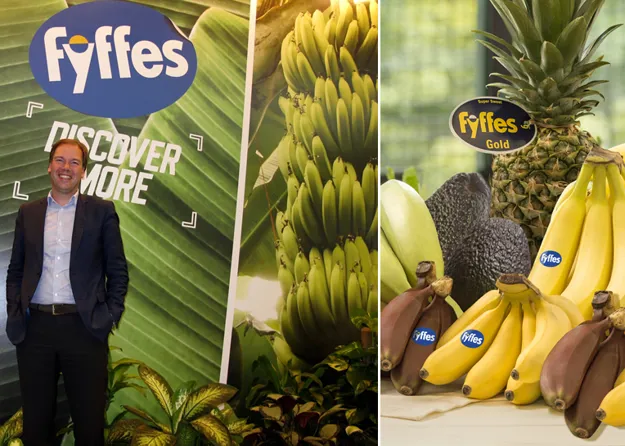
How was 2019 for Fyffes?
“The year 2019 was a reasonable year for us. Market prices were a little better than in the previous two years but could have been better. In our opinion, banana prices are still too low and generally, supply still outweighs demand. In the Northern European and Scandinavian markets, banana sales are dominated by fixed prices or contractual sales, which means the market effect is not as great as before. This is an increasing trend and at the moment it accounts for 85% of our planned volume.”
What volume of tropical fruit does Fyffes market?
“For bananas, the total volume is around 70 million boxes, of which we market 50 - 55 million in Europe. We also sell roughly 15 million boxes of pineapples and another 25 million boxes of melons on the North American market, where we are the market leader for this product.”
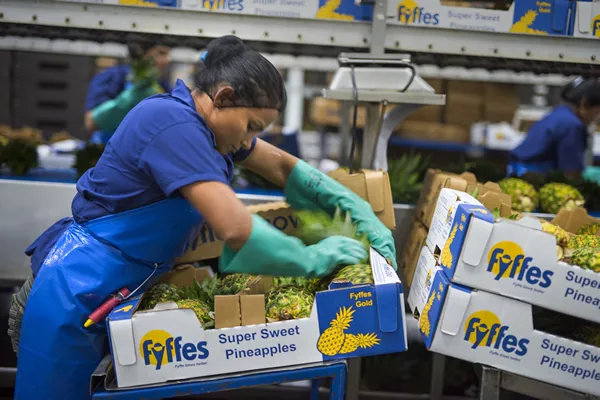
Has much has changed since Fyffes became part of the Japanese company, Sumitomo?
“In Rotterdam, little has changed operationally but we have gained Japanese colleagues in the business development and supply chain departments. Our strong executive board is as before. With Sumitomo as the parent organization, Fyffes is even better placed to continue with our strategy of expanding in different regions of the world as well as investing in both forward and backward chain integration.”
What is the share of the company’s own cultivation?
“Fyffes sources 100% of our melons from our own farms. For pineapples, that is about 60%. It is lower for bananas as we have developed very effective partnerships with both large and small producers across several source countries. Fyffes has several plantations in Costa Rica and Belize and I believe that there is a possibility to add more of our own banana production in future. Recently, we have started growing avocados in Colombia, too.
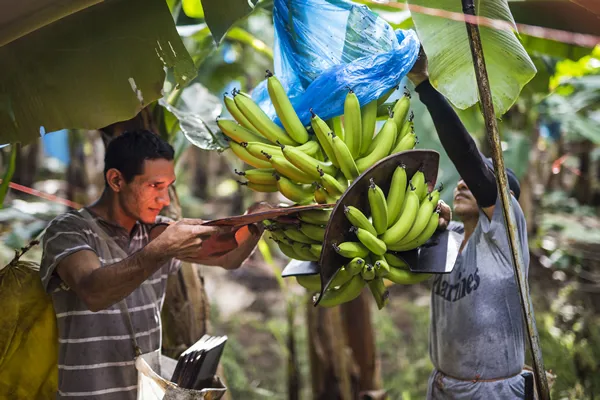
Do you still see much growth potential for banana sales in Northwestern Europe? Or is it becoming more difficult due to, for example, competition from other fruits which are becoming more readily available year-round?
“Banana imports to Europe have increased in recent years driven by higher production. There is always competition from other fruit, but bananas have been a steady product in supermarkets for many years. The advantage is that bananas have broad consumer appeal. Fyffes plans to build on this and to drive diversification and category segmentation. Our customer concepts for our clients and consumers includes so far singles, bananas for kids and sustainable packaging. We see a lot of potential in developing concepts which align supply and retailer strategy with consumer need. Our focus is on growing the banana category through innovation and premiumisation. We have developed a category plan which includes different expansion elements, adding value to the product and the shopping experience.”
To what extent do banana diseases like TR4 and Black Sigatoka threaten the banana trade?
“TR4 was found in northern Colombia last year and the fear is that it will spread to other parts of Central and South America. However, at the same time, I am very impressed with how seriously the authorities are taking the spread of this disease and, above all, banana production itself. The government has invested a significant amount of time and money in combating the spread of this disease and protecting the plantations as much as possible. In addition, the investment provides for affected areas to be placed in quarantine in a controlled manner. To gain entry onto a farm you must go through a footbath, donning overalls and clean boots and having registered properly. I think this is partly why the impact on the total production of Cavendish banana is less likely to be the same as, for example, in the Philippines or China. In addition, other institutions are developing resistant or more tolerant varieties.”
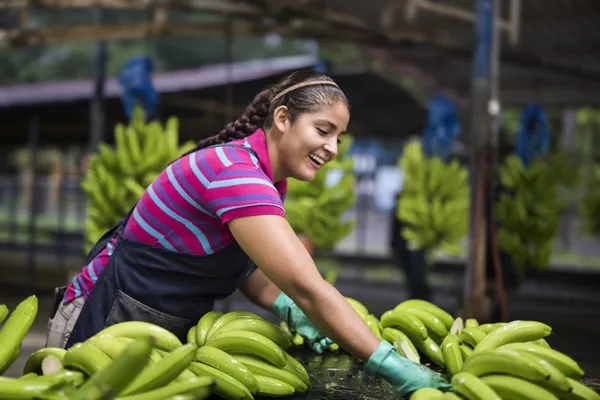
How Fairtrade are your bananas?
“Fyffes is the European market leader when it comes to Fairtrade-certified bananas. Around 15% of our total volume is now Fairtrade certified, part of this is being Organic also. In recent years, millions of dollars from the Fairtrade premium have been invested in the production areas where we source our Fairtrade bananas. These investments have a major impact. However, for us, Fairtrade is not the only label that stands for sustainability. For several decades, Fyffes has been contributing to a sustainable banana industry in many ways and we work with our producers on all levels to structurally improve the lives of people in our production areas and their communities. The focus is on health, education, culture, and sport. Fyffes has a clear sustainability strategy with pillars linked to the United Nations’ Sustainable Development Goals. In addition to that, we are active in many industry-related organizations that strive for sustainability, such as SIFAV, WBF, ABNB, etc. We have recognized that consumers, certainly millennials, are increasingly asking questions about our products. Our ‘Discover More’ campaign addresses this, providing clients and consumers with more insight into how our products are grown and the values and commitments behind that.
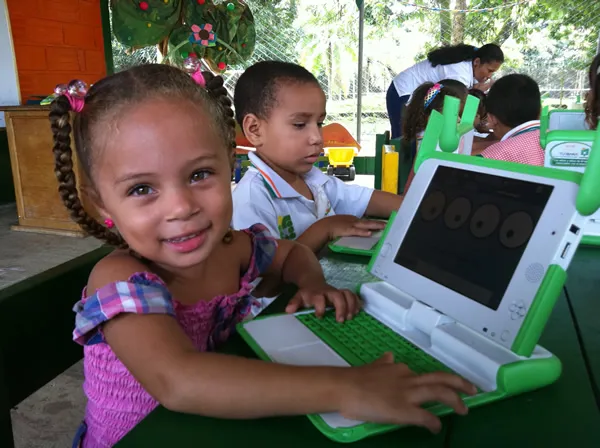
Is that why you switched to blockchain technology?
“Yes, we want to be entirely transparent about our bananas’ origin, and we want to give insight into the joint efforts we make in the areas of people, nature, and the environment. There has been a lot of recent attention on the so-called externalities within agricultural production chains, including bananas – such as wages, water usage and CO2 emissions. That is why we have developed climate-neutral bananas in partnership with the [Dutch] supermarket chain PLUS, and our technology partner Supply Chain Information Management (SIM). For this, the independent Climate Neutral Group calculate the CO2 emissions per box of bananas. In the first stage we compensate for these and our aim in stage two is to actively reduce them throughout the supply chain. Thanks to the blockchain developed by SIM, we can provide reliably information and transparency about the different stages in our chain to customers and consumers. By scanning the QR code on loose bananas and entering the Fairtrade FLO-ID, consumers can follow the journey of their banana’s from plantation to their shopping basket. This begins at one of the 17 cooperatives in the Urabá region of Colombia where the bananas are grown. The blockchain contains information about when the bananas were harvested and includes socio-economic activities, certification and the CO2 footprint of each of the links in the chain. Our goal is to develop initiatives with our partners that will reduce carbon emissions throughout the whole chain.”
Can we expect a further expansion of your portfolio?
“As part of our diversification, we have developed an exotic range. This now includes plantains, red bananas, baby bananas, cassava, and soon avocados from our own production in Colombia. There is a significant growth potential in avocados and we want to expand in this market. A better supply-demand balance will develop on the avocado market in the long run but for now, this market is still demand-driven. The Fyffes ‘Discover more’ campaign will support this and lay the foundation for further innovations and New product development (NPD). You can expect to hear a lot from us.”
Visit Fyffes on the Fruit Logistica - Hall 5.2 - A-03
 For more information:
For more information:
Michaela Schneider
Fyffes
Tel: +49 (0)40 329 00 205
MSchneider@Fyffes.com
www.fyffes.com
